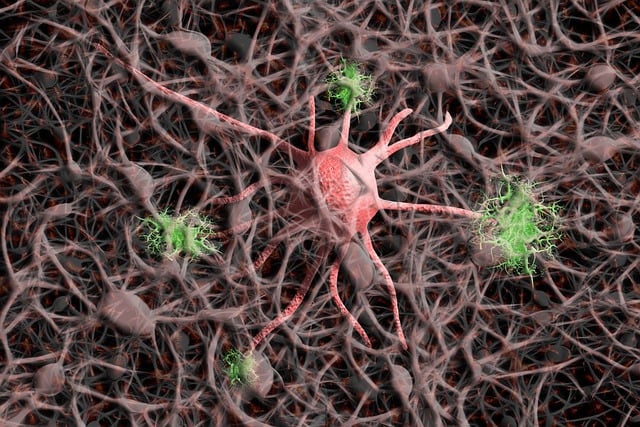The Endocannabinoid System (ECS) is a vital network regulating homeostasis, including mood, emotion, and mental health. By modulating neurotransmitters like dopamine and serotonin, the ECS plays a crucial role in balancing emotional states. Dysregulation of the ECS is linked to mood disorders, making it a promising therapeutic target. Cannabis compounds interact with the ECS, offering potential treatments for anxiety and depression without psychoactive effects. Understanding this system is key to developing novel mental health management strategies and personalized medicine approaches based on ECS functions.
Understanding the Endocannabinoid System is key to unraveling our body’s natural mood regulation. This complex network of receptors and molecules plays a pivotal role in maintaining emotional balance. In this article, we explore the intricate relationship between cannabinoids, endocannabinoids, and mood disorders. From the science behind cannabis’ effects on stress and anxiety to potential benefits of CBD, we delve into the latest research. Additionally, we uncover terpenes’ aromatic influence on mood and preview future directions in mood-influencing therapies.
What is the Endocannabinoid System?

The Endocannabinoid System (ECS) is a complex physiological system that plays a crucial role in maintaining homeostasis, or balance, within the human body. It’s a network of cell receptors and molecules that regulate various bodily functions, including mood, appetite, memory, pain sensation, and immune response. Understanding the ECS is essential when exploring how mood is influenced on a cellular level.
This system is named after the cannabis plant, as researchers initially discovered its existence while studying the effects of cannabis on the body. However, it’s important to note that the ECS doesn’t directly interact with psychoactive compounds found in cannabis; instead, it modulates the effects of these compounds through its intricate communication network. The ECS consists of endocannabinoids (natural chemicals produced by our bodies), receptors (CB1 and CB2), and enzymes that create and break down endocannabinoids. This dynamic system helps maintain stability, responding to internal and external stimuli to promote optimal health and well-being.
The Role of Cannabinoids in Regulating Mood

The Endocannabinoid System (ECS) plays a crucial role in regulating mood, emotion, and mental health. It’s a complex signaling system within our bodies that utilizes cannabinoids, neurotransmitters, and receptors to maintain homeostasis. This system is involved in various processes, including stress response, memory formation, and pleasure sensation. By interacting with the ECS, cannabinoids can influence neurotransmitters like dopamine and serotonin, which are closely linked to mood regulation.
One of the key roles of the ECS is to help balance our emotional state by moderating the effects of stress hormones. When we experience stress, the ECS activates a series of reactions that aim to restore equilibrium. Cannabinoids, such as anandamide and 2-AG, act as endogenous ligands, binding to specific receptors (CB1 and CB2) to modulate neural activity. This modulation can lead to feelings of calmness and relaxation, potentially offering therapeutic benefits for individuals dealing with mood disorders and anxiety. Understanding the intricate relationship between cannabinoids and the ECS provides valuable insights into the complex nature of mood influence.
How Endocannabinoids Impact Emotional States

The endocannabinoid system (ECS) plays a pivotal role in regulating emotional states and mood. This complex physiological system, named after the cannabis plant, produces and utilizes endocannabinoids—natural compounds that act as neurotransmitters. One of the key players is anandamide, often referred to as the ‘bliss molecule,’ which binds to cannabinoid receptors in the brain, promoting feelings of pleasure, relaxation, and well-being. When our bodies experience stress or emotional distress, the ECS is activated, releasing endocannabinoids that help restore balance and maintain homeostasis.
Understanding the ECS is crucial because dysregulation can lead to mood disorders. Imbalances in endocannabinoid levels have been linked to conditions like anxiety, depression, and even post-traumatic stress disorder (PTSD). Targeting the ECS has become a promising therapeutic approach for these disorders, as seen in research exploring the potential of cannabinoid-based treatments. By interacting with this intricate system, scientists aim to harness the power of endocannabinoids to influence emotional states positively, offering new avenues for managing mental health conditions.
Exploring the Connection Between Cannabis and Mental Health

The connection between cannabis and mental health has sparked interest and research in recent years, with a growing understanding of the complex relationship between these two aspects. Exploring this link involves delving into the intricacies of the endocannabinoid system (ECS), a physiological system that plays a crucial role in maintaining homeostasis within the body. The ECS is involved in various processes, including mood regulation, memory formation, and pain perception.
Cannabis interacts with the ECS through its active compounds, most notably tetrahydrocannabinol (THC) and cannabidiol (CBD). THC binds to cannabinoid receptors in the brain, influencing mood, appetite, and cognition, while CBD has been found to have potential therapeutic effects on anxiety and depression without inducing psychoactive properties. By understanding how cannabis interacts with this natural system, researchers are uncovering new insights into mental health management, offering a promising avenue for alternative treatments and further exploration.
Understanding Mood Disorders and Their Treatment Options

Understanding mood disorders is crucial, as they significantly impact an individual’s daily life and overall well-being. Mood disorders, such as depression and bipolar disorder, are characterized by persistent feelings of sadness, elevated moods, or extreme emotional instability. These conditions can greatly affect one’s ability to function normally in various aspects of life.
Treatment options for mood disorders have evolved, offering a multi-faceted approach. One emerging area of interest is the exploration of the endocannabinoid system (ECS) and its potential role in regulating mood. The ECS plays a crucial part in maintaining emotional balance by influencing neurotransmitters like serotonin and dopamine. By understanding how the ECS functions, researchers are developing novel treatments that target this system, providing hope for improved management and potentially even prevention of mood disorders.
The Science Behind Cannabis' Effects on Stress and Anxiety

Cannabis has long been known for its potential to alleviate stress and anxiety, but the science behind these effects is complex and rooted in the endocannabinoid system (ECS). This endogenous system plays a crucial role in maintaining homeostasis, or balance, within our bodies. The ECS consists of endocannabinoids (natural compounds produced by our bodies), receptors (CB1 and CB2), and enzymes that create and break down endocannabinoids.
When cannabis is consumed, its primary psychoactive compound, THC, binds to CB1 receptors in the brain. This interaction can modulate various aspects of brain function, including mood, memory, and perception. The effect on stress and anxiety may involve the release of other neurotransmitters like dopamine and serotonin, which are known to regulate emotions and promote feelings of well-being. Research suggests that cannabis can interact with the ECS to decrease activity in areas of the brain associated with fear and stress response, potentially offering a novel approach to managing mental health conditions characterized by elevated anxiety levels.
Potential Benefits of CBD for Enhancing Mood

The potential benefits of CBD for enhancing mood have gained significant attention in recent years, especially within the context of understanding the Endocannabinoid System (ECS). The ECS is a complex physiological system that plays a crucial role in maintaining balance and homeostasis in our bodies. It influences various processes, including mood regulation, appetite, sleep, and pain perception. CBD, or cannabidiol, interacts with this system by binding to specific receptors, such as CB1 and CB2, which are responsible for modulating emotions and cognitive functions.
Research suggests that CBD may help stabilize mood by interacting with neurotransmitters like serotonin and dopamine. Serotonin is often referred to as the ‘feel-good’ hormone and plays a vital role in regulating happiness, calmness, and sleep. By enhancing serotonin’s availability and signaling, CBD could contribute to improved emotional well-being. Additionally, CBD’s anti-inflammatory properties may also play a role in mood enhancement by reducing inflammation linked to various mental health conditions.
Terpenes: Unlocking Aromatic Mood Influencers

Terpenes, often recognized for their distinctive aromas and flavors in plants, play a surprising yet significant role in mood influence through their interaction with the endocannabinoid system (ECS). These aromatic compounds, found in many cannabis strains, are known to modulate the activity of endocannabinoids, which are neurotransmitters that regulate various physiological processes, including mood, memory, and appetite. When inhaled or consumed, terpenes can enhance or alter the effects of cannabinoids like THC and CBD, creating unique experiences that extend beyond simple psychoactive effects.
Research suggests that different terpenes have distinct effects on the ECS. For instance, myrcene is known for its sedative properties, promoting relaxation and sleepiness. Meanwhile, limonene boosts mood and reduces anxiety through its interaction with receptors in the ECS, evoking a sense of calm and clarity. Understanding these interactions offers insights into how natural compounds can influence our emotional states, highlighting the intricate relationship between scent, taste, and well-being.
Future Research and Considerations in Mood-Influencing Therapies

Future research should aim to deepen our understanding of the intricate relationship between the endocannabinoid system and emotional states, exploring its potential as a therapeutic target. By elucidating the specific mechanisms through which cannabinoids interact with mood-regulating pathways, scientists can develop more precise and personalized treatments. This includes investigating the role of different cannabinoid receptors and their modulation of neurotransmitters involved in mood disorders, such as serotonin and dopamine.
Additionally, considering the individual variability in the endocannabinoid system could lead to more effective interventions. Personalized medicine approaches, tailored to an individual’s unique biochemical makeup, may offer superior results. Further studies on long-term effects and optimal dosing strategies are also necessary to ensure the safe and effective implementation of mood-influencing therapies based on endocannabinoid system modulation.
